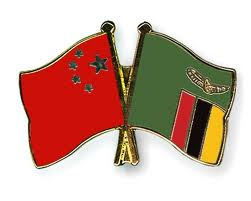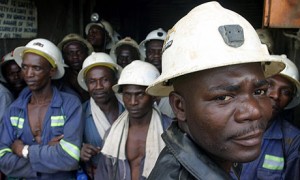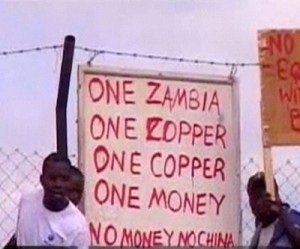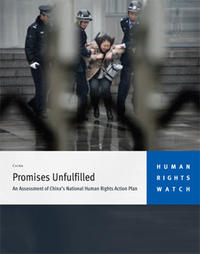Labor Abuses in Zambia’s Chinese State-owned Copper Mines
While Apple’s alleged labor abuses at its factories in China have been the talk of the press – both in the U.S. and in China – ignored has been China’s labor abuses in Africa. But two weeks ago, Seton Hall School of Law, which is quickly establishing its China law credentials in the tri-state area, hosted a timely and informative discussion on labor abuses at Chinese state-owned copper mines in Zambia. Like western consumers – and increasingly China’s middle class – hungry to get their hands on the newest Apple product, China, with its rapid growth, is desperate for natural and mineral resources. Seton Hall‘s event, “Labor Abuses in Zambia’s Chinese State-owned Copper Mines,” examined the issues that arise when a country uses another to feed its insatiable hunger and raised questions about what is the legal and moral responsibility of China in its Zambian mines, the responsibility of the Zambian government to its own people, and the role of the international community, which itself hasn’t shied away from exploiting African nations in a similar manner for their own gain. Below, James J. Baber, a first-year law student at Seton Hall, reports on the February discussion.
To listen to the audio of the entire discussion, please click here.
Length: 1 hour 51 minutes
Phelim Kine on Chinese Abuses of Workers’ Rights in Zambia
By James J. Baber*
On February 6, 2012, Phelim Kine, a Senior Asia Researcher for Human Rights Watch, spoke at Seton Hall Law about his experiences investigating the business practices of Chinese corporations investing in Zambia’s copper mines. Mr. Kine presented the official Human Rights Watch (“HRW”) report “You’ll Be Fired If You Refuse”: Labor Abuses in Zambia’s Chinese State-owned Copper Mines“. The event was hosted by Seton Hall Law Professor Margaret K. Lewis, a Public Intellectuals Program Fellow with the National Committee on US-China Relations. Mr. Tom Kellogg, Program Director and Advisor to the President of Open Society Institute, also took part, offering commentary on the report.
The Human Rights Watch report details the persistent abuses in Chinese-run mines, including poor health and safety conditions, regular 12-hour and even 18-hour shifts involving arduous labor and anti-union activities, all in violation of Zambia’s national laws or international labor standards. The four Chinese-run copper mining companies in Zambia are subsidiaries of China Non-Ferrous Metals Mining Corporation, a state-owned enterprise under the authority of China’s highest executive body. Copper mining is the lifeblood of the Zambian economy, contributing nearly 75 percent of the country’s exports and two-thirds of the central government revenue.
The discussion focused on HRW’s concerns regarding Chinese business practices overseas. A central question is whether the Chinese government or Chinese state-owned firms are effectively “exporting” the kinds of abuses – of labor rights and rights of freedom of expression and association that occur all-too-frequently in China – to foreign countries which are targets of Chinese investment.
Mr. Kine began by speaking about labor practices in the Chinese-run copper mines in Zambia. China has had for some time a massive presence in Africa, and the copper mines in
Zambia are an extension of this long-term investment. The driving force behind this modern day scramble for Africa is a desire of the Chinese government to both secure new markets and to maintain a stable flow of resources for its rapidly expanding economy. According to Mr. Kine, despite the badly needed foreign investment and job opportunities that the Chinese investment brings to Zambia, the relationship leaves something to be desired from the Zambian workers’ perspective. Mr. Kine stated that the conditions in some mines were found to be a “flagrant violation of both Zambian law and international law.” HRW interviewed numerous workers to obtain first-hand information about the miners’ working conditions. The HRW investigators uncovered various abuses of workers’ rights, ranging from the firing of workers who refused to work in hazardous areas to the manifest reluctance of the Chinese firms to provide their workers with proper safety and protective equipment. Despite the issues and clear dangers involved, however, few of the miners quit these jobs because of the high double-digit unemployment in Zambia. [See CIA Handbook for a review of Zambia’s economy]
In total, the HRW researchers interviewed 170 people and found three main problems: abuses of the miners’ legal rights to health and safety, violations of overtime pay requirements, and what Mr. Kine called a “pronounced anti-union sentiment” in the Chinese mines. The miners were routinely denied access to, or left unsupplied with, personal safety equipment like protective clothing and respirators. Mr. Kine stated that workers at the Chinese mines were also paid “one third to one sixth less than their international competitors.” In addition, the Zambian miners were severely discouraged from associating with one of the two national unions, thereby depriving the miners of the right to associate.
After Mr. Kine concluded his initial presentation, Tom Kellogg raised additional questions and offered comments. Mr. Kellogg spoke about the common perception of the local Africans that the Zambian government encouraged the influx of Chinese investment and thus the Zambian government gave only lax scrutiny to the mines’ labor practices.
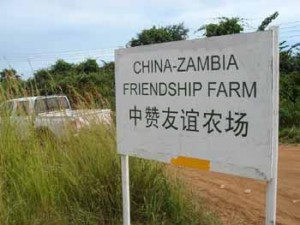 Despite the Chinese government’s history of bluntly refuting international criticism, Mr. Kellogg noted that the Chinese government is beginning to present a more evolved response to international criticism. He specifically mentioned the detailed response of Chinese authorities with regard to the letter from HRW detailing reported issues within the mines. Mr. Kellogg speculated on whether or not such a response would have happened five years ago.
Despite the Chinese government’s history of bluntly refuting international criticism, Mr. Kellogg noted that the Chinese government is beginning to present a more evolved response to international criticism. He specifically mentioned the detailed response of Chinese authorities with regard to the letter from HRW detailing reported issues within the mines. Mr. Kellogg speculated on whether or not such a response would have happened five years ago.
The microphone was then returned to Mr. Kine for response. He responded to Mr. Kellogg’s suggestion of Beijing’s possible new openness to international criticism as opposed to the traditional stonewalling. He noted that HRW had in fact been able to speak directly with the China Nonferrous Mining Corporation in order to address alleged violations of the Zambian workers’ rights. Mr. Kine also highlighted that all of the Zambian workers with whom HRW spoke stated that they were happy to have jobs despite complaints about the working conditions. Zambia suffers from both high unemployment and an AIDs epidemic. And the jobs and infrastructure provided by the Chinese companies are significant assets to the African nation.
Professor Lewis then commented that the Zambian laws regarding mining were quite good on paper but, as noted by one of the interviewees in the report, seemed to be disconnected from the reality on the ground. Other questions revolved around whether the miners were aware of international labor laws and whether foreign consumers might play a more pronounced role in demanding better labor practices in copper mines.
Professor Lewis also commented on Beijing’s soft power push to present a new image by spreading Chinese culture through the Confucius institutes and classrooms. The Chinese government is being more responsive to international human rights concerns, but Professor Lewis noted that the current crisis in Syria shows that Beijing is still very concerned about not being seen as promoting popular uprisings or infringing on a state’s sovereignty.
Mr. Kine then noted that the Zambian government has very limited resources at its disposal to combat the issues arising out of the Chinese-owned-and operated mine facilities. A lack of
money and manpower coupled with the apparent lack of importance that the Chinese government places on human rights in its overseas endeavors is creating a very difficult situation for the Zambian miners. However, Mr. Kine did find cause to express some hope for the future. Recently, a Zambian government official had threatened to shut down a mine (albeit a privately invested mine, not a Chinese state-invested one) that did not conform to safety codes. Mr. Kine thought that this action might indicate that the Zambian government will in the future be better able to provide for the safety of Zambian citizens who work in the copper mines. Mr. Kine, in fact, called the Zambian threat to close the mine, “a shot across the bow” that may help convince the Chinese government to start toeing the line with more vigor.
The presentation concluded with a lengthy question and answer segment, in which the three experts tackled various questions both about China in general and the discussion at hand. One questioner asked whether the Chinese companies could in fact be forced out of their mines for rampant safety violations. Mr. Kine stated that this approach was “worth testing” because the Zambian government needs to use its leverage more directly, instead of engaging in mere fiery rhetoric. He then again referenced the renewed push by the Zambian government to assert its authority by threatening to close one of the mines. The discussion ended on a high note, with the three presenters presenting their “wish lists” for the future of change in China.
* The author is a first-year Juris Doctor student at Seton Hall University School of Law, and received his BA in Philosophy from the University of San Francisco. Mr. Baber is a member of Seton Hall’s International Law Society.
 On Facebook
On Facebook By Email
By Email 